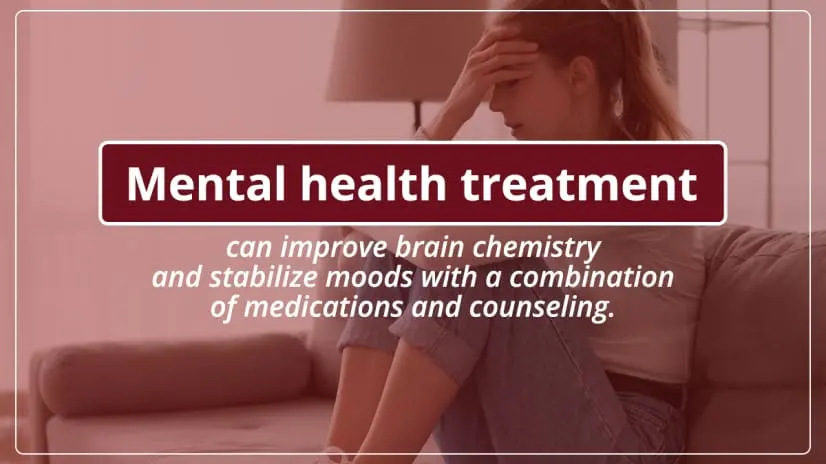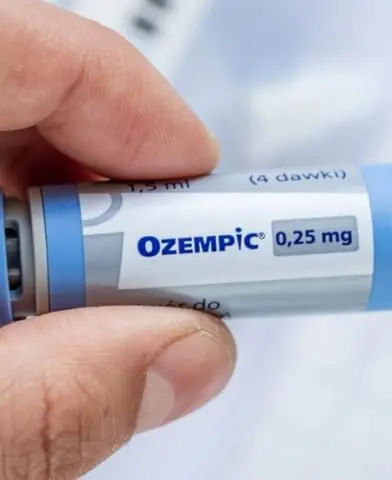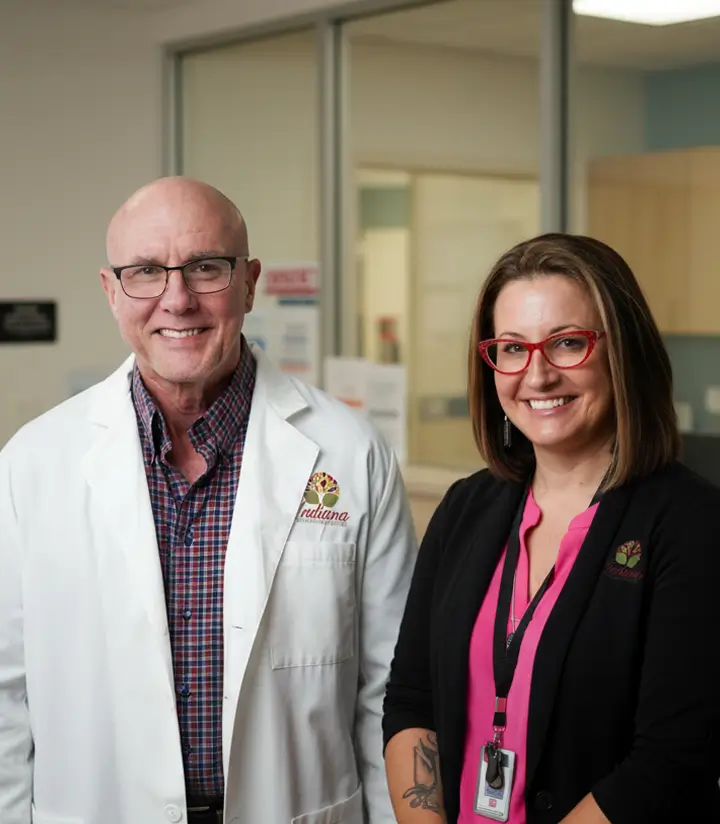
Five Things to Know About Mental Health Treatment
Clinically Reviewed by:
If you are struggling with mental health and feel that it is taking control of your life, you are not alone. According to the National Institute of Mental Health (NIH), about one in five adults in the United States have mental health problems. People are often struggling with symptoms of depression, anxiety, bipolar, or PTSD.
Some days, it may feel very challenging to function when you are feeling overwhelmed by a constant state of anxiety, depression, and even substance use disorder. However, there are several ways to improve your mental health, especially when seeking mental health treatment.
Here are five points for you to help understand how mental health treatment works and how certified treatment providers can help you.

Key Takeaways
Mental health treatment doesn’t have to be intimidating. Here’s what you need to know:
- Mental health treatment can improve brain chemistry and stabilize moods with a combination of medications and counseling.
- Mental health treatment can be helpful to any person with a mental health condition.
- Mental health treatment is used to help treat substance use disorder.
- Mental health treatment teaches valuable coping skills for daily life.
Learn more about mental health treatment at Indiana Center for Recovery by calling (844) 650-0064.
Mental Health Treatment and Brain Chemistry
Mental illnesses may be caused by abnormal changes in brain chemistry. Specifically, neurotransmitters, the chemical messengers in the brain, may not be producing sufficient natural levels of dopamine, norepinephrine, and serotonin.
As a result, this often results in mood imbalances, causing depressive symptoms such as fatigue, sadness, or loss of interest or pleasure. Therefore, mental health treatment aims to restore the natural balance of neurotransmitters with the assistance of medications.
Medications that are commonly used in treatment are selective serotonin reuptake inhibitors, also known as SSRIs. In addition to the medication, treatment also consists of a combination of counseling and support groups.
According to the National Library of Medicine (NIH), changes in brain chemistry caused by mental illness often make it difficult to relate to others or function on a daily basis. This shows the importance of seeking mental health treatment in order to enjoy and operate on a day-to-day basis.
Mental Health Treatment Benefits Everyone
If you have been skeptical about pursuing mental health treatment because you are unsure if treatment will work for your situation, there is no need to be hesitant anymore because mental health treatment works for all.
According to the Substance Abuse and Mental Health Services Administration (SAMHSA), studies show that treatments for mental illnesses are effective, and by seeking mental health care, people can recover fully from their conditions to feel stable and healthy.
Mental health treatment can be provided in many different ways by a variety of sources. Although mental health treatment can help all with a mental illness, the effectiveness of treatment varies per person. For example, some individuals may seek mental health treatment from a primary care provider, such as a family doctor.
Other individuals may find mental health treatment from a specialized psychiatrist most effective. There are many types of mental health providers, such as psychologists, clinical social workers, licensed professional counselors, mental health counselors, certified alcohol and drug abuse counselors, and marriage and family therapists.
Whichever type of treatment you pursue, it is important to understand that the first attempt might not always be the most effective. When dealing with medications, it can take some time for the effect to kick in. According to the U.S. Centers for Disease Control and Prevention (CDC), it may take up to four weeks for mental health medication to reach full effect.
It may also take a couple of visits to find a counselor best suited for you. Try your best not to get discouraged in the beginning by these variables. Most important is being proactive and taking the initiative to get the help you need by finding the best-fitted treatment for yourself.
Mental Health Treatment and Substance Abuse
Many people looking for mental health treatment for a mental health disorder are also interested in treatment for substance use, such as alcohol or drug addiction. According to the National Institute of Mental Health (NIH), substance use disorder is considered a mental disorder.
The correlation between mental health and substance abuse is very intricate, requiring expertise, mood stabilizing, and several treatment services. Some experts believe that in certain cases, substance abuse can inflict mental illness, such as marijuana-induced psychosis. However, Jackie Daniels, Director of Clinical at Indiana Center for Recovery, states that people who have a mental illness frequently turn to substances, such as alcohol or drugs, to help self-medicate and soothe an overwhelming amount of anxiety.
It is quite often that those struggling with substance abuse and mental illness have what is called a co-occurring disorder. Reports from SAMHSA conclude that an average of 21.5 million adults have co-occurring disorders. Because of the close relationship between mental health and substance abuse, many treatment facilities provide a dual diagnosis program to help treat the conditions simultaneously.
“Often, the measures that improve one condition, such as counseling, medications, regular exercise, brain stimulation therapies, and enhanced nutrition, can also improve a person’s other conditions,” said Daniels.
Mental Health Treatment Goes Beyond Medication
If you are new to the topic of mental health treatment, you may be under the impression that treatment is only about medication management and behavioral health counseling. Although research shows that management and behavioral health counseling can be effective, many other treatment strategies are available.
Mental health treatment has many different avenues of care because of the variety of mental illnesses. At certain times, an individual’s genetic makeup plays a pivotal role in their mental health status. Other times, environmental factors can be the leading cause of poor mental health.
When a person’s mental health is evaluated, a medical professional will ask their patients about the quality of sleep, activity level, social media habits, and diet. By identifying certain habits that contribute to their mental health condition, experts can identify a treatment plan best suited for their patients. With a proper treatment plan, daily triggers can be identified to learn how to cope and manage throughout daily life.
Over time, people begin to make progress. Towards the later stages of treatment, having as many sessions as there were in the beginning may not be necessary. However, periodic sessions and follow-ups are still encouraged to help maintain mental wellness. For those who are in mental health treatment for addiction, it is strongly suggested to join local support groups such as Alcoholics Anonymous (AA) or Narcotics Anonymous (NA). With the help of the 12-step program, its members, and meetings, people can stay sober and healthy.
Mental Health Treatment and Coping Skills
Mental health treatment can teach useful coping skills to navigate daily challenges. “Mental health treatment programs can expose you to cognitive-behavioral techniques to increase resilience. Many people find that this is one of the most important and long-lasting benefits of a formal mental health treatment program,” says Daniels.
Learning how to manage stress in a healthy manner can help you avoid the same pitfalls that you may have been vulnerable to in the past. You may also learn to be less influenced by outside forces and more reliant on your inner sense of confidence.
Frequently Asked Questions (FAQ)
Can mental health be treated?
Yes, mental health can be treated through medication, behavioral therapy, and lifestyle changes. Mental health treatment can effectively minimize symptoms so individuals can function in work, school, or social environments.
Can a person with mental illness be able to live a normal functioning life?
Mental illnesses are disorders that affect a person’s thoughts, moods, and behavior, ranging from mild to severe. With consistent mental health treatment, people with mental illnesses can manage their condition, overcome challenges, and be able to function in their daily lives.
Mental Health Treatment at Indiana Center for Recovery
Understanding mental health treatment can feel overwhelming, but knowing how treatment works can help you take the first step. If you’re struggling with depression, anxiety, bipolar disorder, PTSD, or other mental health conditions, Indiana Center for Recovery offers evidence-based treatment to help you manage symptoms and improve your quality of life.
Our comprehensive mental health care provides therapy, medication management, and counseling to help stabilize brain chemistry, teach coping skills, and support your recovery journey.
When mental health conditions co-occur with substance use, our dual diagnosis treatment addresses both conditions simultaneously, using treatments like counseling, medication, and lifestyle changes that can improve multiple conditions at once.
For flexible support that fits your schedule, our outpatient mental health programs offer therapy sessions, medication management, and ongoing support while you maintain your daily routines.
Find support near you at our mental health treatment centers across Indiana. Call (844) 650-0064 today to learn more about our mental health treatment programs and how we can help you on your path to wellness.






 100% Confidential
100% Confidential
